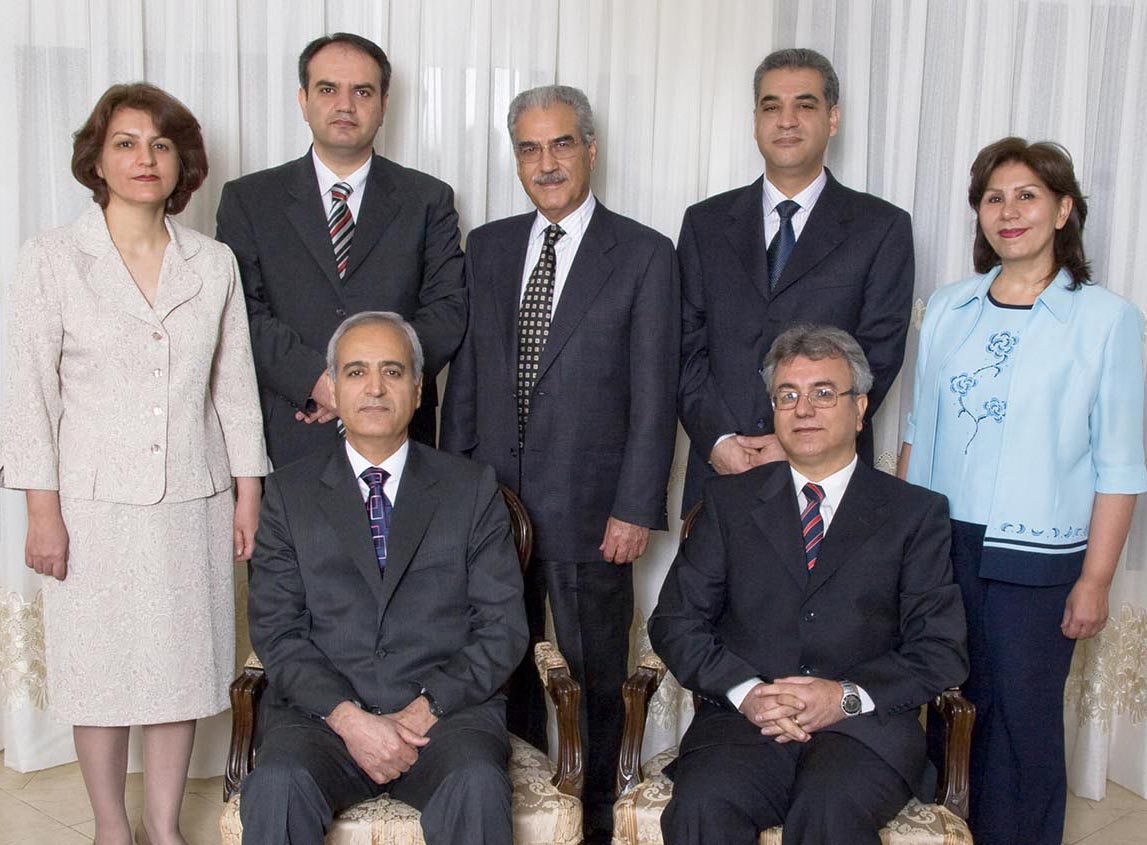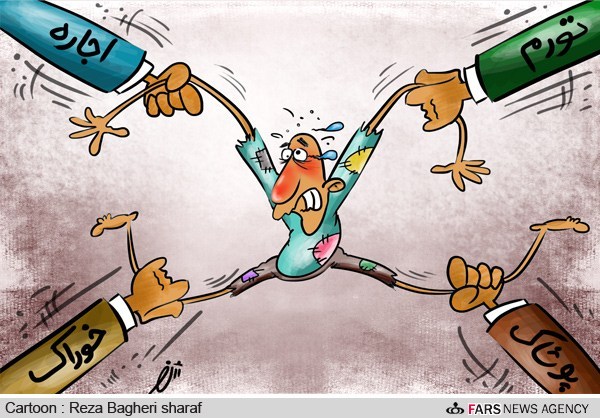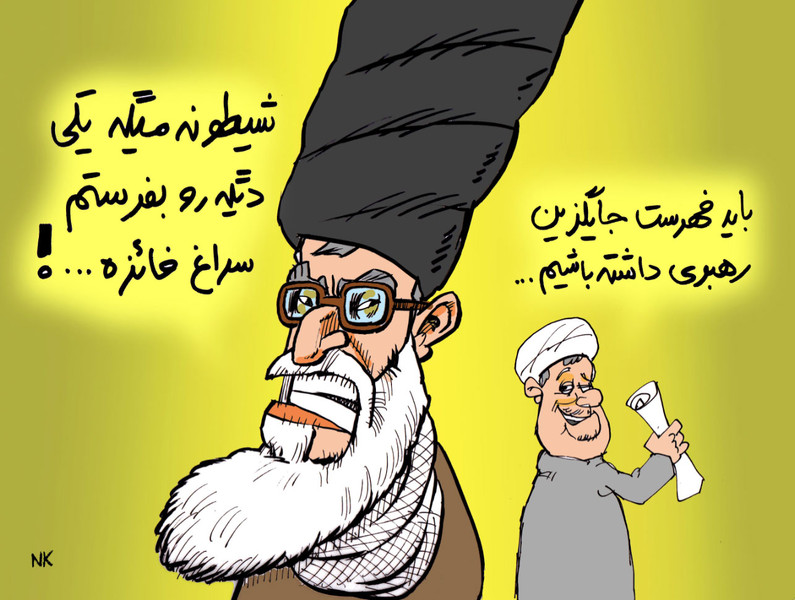 7 Detained Baha'i Leaders (see 0500 GMT)1825 GMT: Ahmadinejad Watch. Asr-e Iran post a catalogue of the President's speeches in which he blames "conspirators" for the Government's problems.
7 Detained Baha'i Leaders (see 0500 GMT)1825 GMT: Ahmadinejad Watch. Asr-e Iran post a catalogue of the President's speeches in which he blames "conspirators" for the Government's problems.
1814 GMT: Political Prisoners Watch (Journalists Edition). Almost 130 Iranian journalists have called on head of judiciary Sadegh Larijani and Speaker of Parliament Ali Larijani to take action against the on-going repression of those in the media.
The journalists highlighted the recent imprisonment of journalists Mahsa Amrabadi and Reza Ansari-Rad, as well as a flogging sentence handed down to cartoonist Mahmoud Shokraye: “Precisely at a time when the suspect in the [detainee abuse scandal at] Kahrizak detention centre [Presidential aide Saeed Mortazavi] is promoted, and the forces under your authority turn a blind eye to the accusations against him, Iranian journalists are, one by one, imprisoned, defamed and even physically abused.”
They said that while “the main suspects and culprits" in the $2.6 billion bank fraud" could continue freely with their extravagant lifestyles, Mahsa Amrabadi, Reza Ansari-Rad and other Iranian journalists were being jailed “for the sole crime of writing".
Last week, Amrabadi was summoned to serve a one-year sentence in Evin Prison. Her husband, journalist Masoud Bastani, has been imprisoned for six years.
The statement declared, “We call for an end to the flogging; we call for an end to all forms of lawlessness, injustice and disrespect towards those who hold the pen. We call for the implementation of the law. We seek respect for the pen.”
More than 100 journalists have been imprisoned since the 2009 Presidential elections. Dozens are still behind bars, while others are on heavy bail and under threat of being summoned to serve their sentences.
1523 GMT: Death to the Rapper Watch. Arshama3's Blog has issued a call for solidarity with rapper Shahin Najafi, who is facing calls by senior clerics for his death after his song, "Naqi", about Iran's political and social problems.
1514 GMT: Foreign Affairs (Bahrain Front). Saudi Arabia may have pulled back from the idea of "political union" with Bahrain, but Iran is going to extract the maximum benefit from propaganda.
The Islamic Propagation Coordination Council has urged Iranians to gather after Friday Prayers "to protest against the American plan to annex Bahrain to Saudi Arabia and express their anger against the lackey regimes of Al-Khalifa and Al-Saud".
The Council continued, "This dangerous plot is the result of the American-Zionist-Britain evil triangle to prevent popular uprisings spreading into other countries of the region and to control the internal crisis in Bahrain which has been caused by the inability of the Al-Khalifa regime to control the situation. Al-Saud and Al-Khalifa should be aware that with this kind of plot they will not stop the popular movement in Bahrain and the movement of Islamic awakening in the region."
The hard-line paper Keyhan went farther, putting out a report describing Bahrain as “part of Iran” and called for its annexation.
The Bahraini Foreign Ministry has hit back with a statement, "We strongly condemn the statements by Speaker Ali Larijani and lawmaker Hossein Ali Shahriari over Bahrain and we consider them blatant interference in Bahrain's domestic affairs and a gross violation of its independence and sovereignty."
The Iranian charge d'affaires was summoned to the Ministry to receive the protest.
1357 GMT: Oil Watch. Earlier today we highlighted the assurance of Minister of Oil Rustam Qassemi (see 1020 GMT) that there had been no decrease in Iran's oil exports this year.
Really? From Bloomberg:
Iran’s oil exports have the potential to fall another 300,000 to 500,000 barrels a day or more when the European Union’s embargo takes effect in July, according to Barclays Plc.
The decline will extend existing losses of 500,000 barrels a day, Barclays analysts led by Helima Croft in London said in an e-mailed report yesterday. Iranian exports may fall even further because of the unavailability of shipping insurance.
Iran was exporting about 2.5 million barrels per day before this year's decline. Other analysts have put the fall in exports at 40% between January and March.
1353 GMT: Cartoon of the Day (2). Fars, linked to the Revolutionary Guards, worries about the economy, "Torn Between Inflation, Costs for Rent, Clothing, and Food":
1344 GMT: Cartoon of the Day. Nikahang Kowsar portrays the current state of relations between former President Hashemi Rafsanjani and the Supreme Leader....
Rafsanjani: "We need a list of successors for the Supreme Leader"
Supreme Leader: "I should send another guy to Faezeh [Hashemi, Rafsanjani's daughter, harassed by regime supporters and sentenced to six months in prison]"
1100 GMT: The House Arrests. Rah-e Sabz reports that oppostion figure Mehdi Karroubi, held under strict house for 15 months, was allowed a short visit with his family during last month's mourning ceremonies for Fatemeh Zahra, the daughter of the Prophet Mohammad.
1020 GMT: Oil Watch. Press TV puts the reassurance:
Iran's Oil Minister Rostam Qasemi has dismissed some recent reports which claim that the Islamic Republic’s oil exports have decreased by 6 percent.
“The country’s oil exports have not decreased,” said the minister in the northeastern Iranian city of Mashhad on Tuesday afternoon.
The Iranian oil minister also refuted other reports which claim that some 30 million barrels of the Iranian oil have been left in limbo.
Only a couple of small problems --- first, the reported drop in Iran's oil exports in the first quarter of 2012, from oil traders and analysts, is not 6% but 40%. And, second, Qassemi might have to explain the stationary tankers offshore and why --- again, according to oil traders --- Iran will have reached maximum capacity for storage in two months and thus have to cut production.
0900 GMT: Oil Watch. Peyke Iran reports serious conflict between Baluchis and security forces in the Sarbaz district in Baluchistan because of the arrests of Sunni clerics after the assass of Prayer leader Molavi Mostafa Jangi.
Several people have reportedly been killed in weeks of clashes
0850 GMT: Oil Watch. Malaysia, which owns 40% of the Shiraz Petrofield refinery, has withdrawn investment.
The refinery reportedly needs 800 million Euros for construction, but has only raised 10% of the funding.
0750 GMT: Currency Watch. After its recent bounce-back, the Iranian Rial is weakening again. On Tuesday, it was 17000:1 vs. the US dollar, having been as high as 15800:1 last week.
The Rial fell 4.5% on Tuesday.
0710 GMT: Nuclear Spin of the Day. The Institute for Science and International Security, which has been a leading actor in the promotion of the Iranian nuclear threat, works the media again today, only a day after Iranian delegates had two days of discussions with the International Atomic Energy Agency and a day before Tehran sits down with the 5+1 Powers in Baghdad.
David Albright, the head of ISIS, declares that a letter from 1991 indicates Foreign Minister Ali Akbar Salehi had knowledge of a program to procure goods for clandestine nuclear programme when he was head of Sharif University.
The letter supported an end-user guarantee to a European supplier of materials that could be used either in a civilian or military nuclear programme. Albright assures, however, "Salehi knew about or was involved in efforts to create an alleged parallel military nuclear program that is of great interest to the IAEA now. And the intention of that program was probably to make nuclear weapons, including producing highly enriched uranium."
A spokesman for Iran's U.N. mission said Salehi had never been involved in any illicit or illegal activity, "We believe that publishing these type of fabricated stories are an attempt to foil the upcoming negotiation."
0705 GMT: Rafsanjani. Mohsen Hashemi, the brother of former President Hashemi Rafsanjani, has left the board of directors of the Tehran Metro.
Hashemi quit as head of the Metro last year after a series of clashes with the Government over funding and operations.
0515 GMT: The Critic Inside the Family. Davoud Ahmadinejad, the brother of the President, has used an interview in a weekly magazine to set out a lengthy criticism of the Government for "breaking the law".
Davoud Ahmadinejad has repeatedly challenged his brother's administration since the disputed Presidential election of 2009.
0500 GMT: Nature, the international journal on science, has been following the case of Omid Kokabee, the graduate student in physics at the University of Texas who was arrested in February 2011 when he returned to Iran for a winter break at the end of 2010.
The journal now summarises the latest development, a 10-year sentence imposed on Kokabee for "‘communicating with a hostile government".
Baha'i Faith notes the fourth anniversary of seven prominent members of the community. The five men and two women, who had formed an ad hoc group to highlight and address the needs of Iran’s 300,000 Baha’is community, were sentenced in August 2010 to 20 years in prison.
The seven are Behrouz Tavakkoli, Saeid Rezaie, Fariba Kamalabadi, Vahid Tizfahm, Jamaloddin Khanjani, Afif Naeimi, and Mahvash Sabet.

